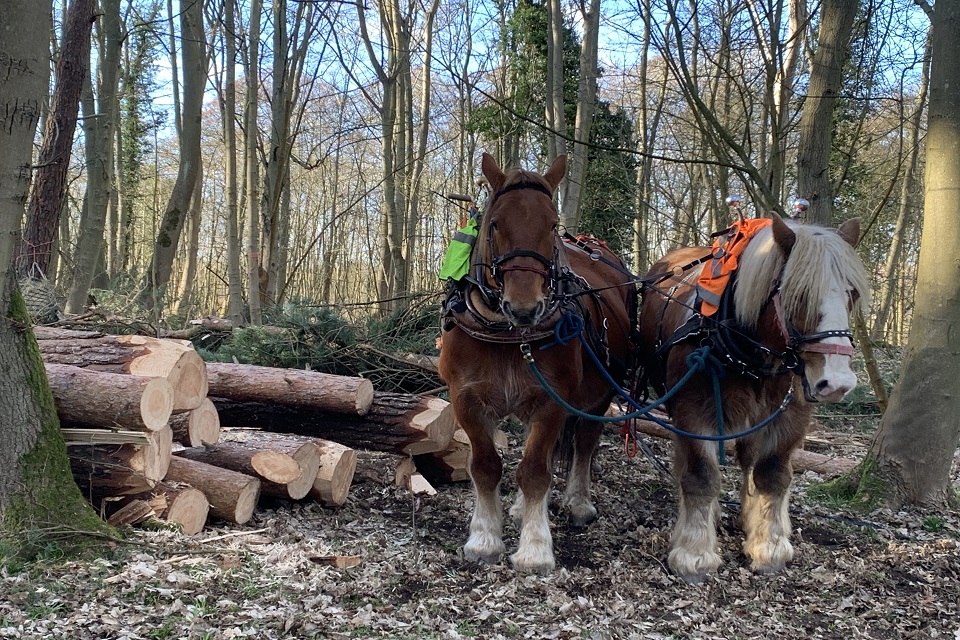Rare Norfolk chalk stream improved for people and wildlife
28 Mar 2023 02:55 PM
The Environment Agency worked with the Norfolk River Trust, Norwich City Council and even horses to improve the River Yare around Norwich.
The River Yare, a rare chalk stream, has had a range of improvements to benefit wildlife and improve water quality.
Woody debris from trees was stacked along the riverbank to create ‘brash berms’. This technique will help to narrow the river and get it to a more natural state, after it was historically altered to help with milling. The brash berms will also trap sediment, improving water quality.
Wood was also used to create areas with different velocity of flow. This will provide wet and dry areas to help aquatic invertebrates and riverside wildflowers thrive.
Additionally, the material was used to create areas of refuge for the fish. This will supply them with cover from predators and give them shelter in higher flows.
The woody debris was brought onto site using heavy horses to reduce the need for heavy machinery, which in turn reduces the project’s carbon footprint.

Heavy horses were used to reduce the need for machinery. Picture credit: Norfolk Rivers Trust
Amy Prendergast, project manager at the Environment Agency, yesterday said:
It is great to work with our partners to make such a difference to this precious chalk stream, the overall water environment and to wildlife.
It is extra rewarding knowing that our work is visible to the public so they can also enjoy the benefits this project will bring.
Sarah Gelpke, project officer at Norfolk Rivers Trust, yesterday explained:
This stretch of the Yare was historically modified, leaving steep riverbanks, a very slow flow and patches of deep silt.
Working with Aquamaintain, we’ve added brash berms and wooden structures to the river channel using local natural resources.
We’re delighted to see that the flow hydrology is already improving because of this work, and we will continue to monitor the site to track the improvement to habitat quality, as well as the broader impact of the project on wildlife and movement of sediment.
Using a Norfolk-based horse logger has enabled us to minimise disturbance to the adjacent woodland and fen grassland.
Chalk streams are a rare and valuable habitat, often referred to as the equivalent of England’s rainforests. It is estimated that 85% of the world’s chalk streams are in England and around 29% of these are in East Anglia. Most water we drink in the east comes from rainwater stored deep beneath our feet in natural chalk ‘aquifers’, which feed our chalk streams.
Additional information:
- The work took place in the Yare Valley near Gurney Lane close to the University of East Anglia.
- Last year, the Environment Agency improved a section of the River Yare at Earlham Park. It created more brash berms, bank protection and dog ramps to enable dogs and their owners to enjoy the river without eroding the banks.
- This work is part of a wider green infrastructure project, which is creating a corridor of linked habitats and green spaces along the Yare Valley. This priority is set out in local planning policy. Under this objective, the Environment Agency and its partners are aiming to improve access to green and natural spaces. Other enhancements in the area to date include:
- In 2018, a new footbridge over the River Yare between Colney and Bowthorpe was constructed, funded by the Community Infrastructure Levy.
- In 2018, fish refuges and ponds were created in Bowthorpe Southern Park, and fast water running gravel glides created in the river nearby.
- Works completed by the developer of the Bartram Mowers site in 2019 have also improved a section of the riverside footpath in Eaton.
- In 2021, new wetland habitats were created along the River Yare near Earlham.
- In 2022, improvements were made to the Yare Valley Walk, supported by funding from the Greater Norwich Growth Board.